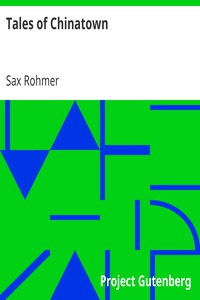Tales of Chinatown by Sax Rohmer (the false prince series txt) 📗

- Author: Sax Rohmer
Book online «Tales of Chinatown by Sax Rohmer (the false prince series txt) 📗». Author Sax Rohmer
In less than a minute the boy returned and beckoned to him to come in. As he did so, and the door was closed, he almost stumbled, so dark was the passage.
Presently, guided by the boy, he found himself in a very business-like little office, where a girl sat at an American desk, looking up at him inquiringly.
She was of a dark and arresting type. Without being pretty in the European sense, there was something appealing in her fine, dark eyes, and she possessed the inviting smile which is the heritage of Eastern women. Her dress was not unlike that of any other business girl, except that the neck of her blouse was cut very low, a fashion affected by many Eurasians, and she wore a gaily coloured sash, and large and very costly pearl ear-rings. As Mr. Hampden paused in the doorway:
“Good morning,” said the girl, glancing down at the card which lay upon the desk before her. “You come from Mr. Isaacs, eh?”
She looked at him with a caressing glance from beneath half-lowered lashes, but missed no detail of his appearance. She did not quite like his moustache, and thought that he would have looked better cleanshaven. Nevertheless, he was a well-set-up fellow, and her manner evidenced approval.
“Yes,” he replied, smiling genially. “I have a small commission to execute, and I am told that you can help me.”
The girl paused for a moment, and then:
“Yes, very likely,” she said, speaking good English but with an odd intonation. “It is not jade? We have very little jade.”
“No, no. I wanted an enamelled casket.”
“What kind?”
“Cloisonne.”
“Cloisonne? Yes, we have several.”
She pressed a bell, and, glancing up at the boy who had stood throughout the interview at the visitor's elbow, addressed him rapidly in Chinese. He nodded his head and led the way through a second doorway. Closing this, he opened a third and ushered Mr. Hampden into a room which nearly caused the latter to gasp with astonishment.
One who had blundered from Whitechapel into the Khan Khalil, who had been transported upon a magic carpet from a tube station to the Taj Mahal, or dropped suddenly upon Lebanon hills to find himself looking down upon the pearly domes and jewelled gardens of Damascus, could not well have been more surprised. This great treasure-house of old Huang Chow was one of Chinatown's secrets—a secret shared only by those whose commercial interests were identical with the interests of Huang Chow.
The place was artificially lighted by lamps which themselves were beautiful objects of art, and which swung from the massive beams of the ceiling. The floor of the warehouse, which was partly of stone, was covered with thick matting, and spread upon it were rugs and carpets of Karadagh, Kermanshah, Sultan-abad, and Khorassan, with lesser-known loomings of almost equal beauty. Skins of rare beasts overlay the divans. Furniture of ivory, of ebony and lemonwood, preciously inlaid, gave to the place an air of cunning confusion. There were tall cabinets, there were caskets and chests of exquisite lacquer and enamel, loot of an emperor's palace; robes heavy with gold; slippers studded with jewels; strange carven ivories; glittering weapons; pots, jars, and bowls, as delicate and as fragile as the petals of a lily.
Last, but not least, sitting cross-legged upon a low couch, was old Huang Chow, smoking a great curved pipe, and peering half blindly across the place through large horn-rimmed spectacles. This couch was set immediately beside a wide ascending staircase, richly carpeted, and on the other side of the staircase, in a corresponding recess, upon a gilded trestle carved to represent the four claws of a dragon, rested perhaps the strangest exhibit of that strange collection—a Chinese coffin of exquisite workmanship.
The boy retired, and Mr. Hampden found himself alone with Huang Chow. No word had been exchanged between master and servant, but:
“Good morning, Mr. Hampden,” said the Chinaman in a high, thin voice. “Please be seated. It is from Mr. Isaacs you come?”
IV
PERSONAL REPORT OF DETECTIVE JOHN DURHAM TO CHIEF INSPECTOR KERRY, OFFICER IN CHARGE OF LIMEHOUSE INQUIRY
Dear Chief Inspector,—Following your instructions I returned and interviewed the prisoner Poland in his cell. I took the line which you had suggested, pointing out to him that he had nothing to gain and everything to lose by keeping silent.
“Answer my questions,” I said, “and you can walk straight out. Otherwise, you'll be up before the magistrate, and on your record alone it will mean a holiday which you probably don't want.”
He was very truculent, but I got him in a good humour at last, and he admitted that he had been cooperating with the dead man, Cohen, in an attempt to burgle the house of Huang Chow. His reluctance to go into details seemed to be due rather to fear of Huang Chow than to fear of the law, and I presently gathered that he regarded Huang as responsible for the death not only of Cohen, but also of the Chinaman who was hauled out of the river about three weeks ago, as you well remember. The post-mortem showed that he had died of some kind of poisoning, and when we saw Cohen in the mortuary, his swollen appearance struck me as being very similar to that of the Chinaman. (See my report dated 31st ultimo.)
He finally agreed to talk if I would promise that he should not be charged and that his name should never be mentioned to anyone in connection with what he might tell me. I promised him that outside the ordinary official routine I would respect his request, and he told me some very curious things, which no doubt have a bearing on the case.
For instance, he had discovered—I don't know in what way—that the dead Chinaman, whose name was Pi Lung, had been in negotiation with Huang Chow for some sort of job in his warehouse. Poland had seen the man talking to Huang's daughter, at the end of the alley which leads to the place. He seemed to attach extraordinary importance to this fact. At last:
“I'll tell you what it is,” he said. “That Chink was a stranger to Limehouse; I can swear to it. He was a gent of his hands; I reckon they've got 'em in China as well as here. He went out for the old boy's money-box, and finished like Cohen finished.”
“Make your meaning clearer,” I said.
“My meaning's this: Old Huang Chow is the biggest dealer in stolen and smuggled valuables from overseas we've got in London. He's something else as well; he's a big swell in China. But here's the point. He's got business with buyers all over London, and they have to pay cash—no checks. He doesn't bank it: I've proved that. He's got it in gold, or diamonds, or something, being wise to present conditions, hidden there in the house. Pi Lung





Comments (0)